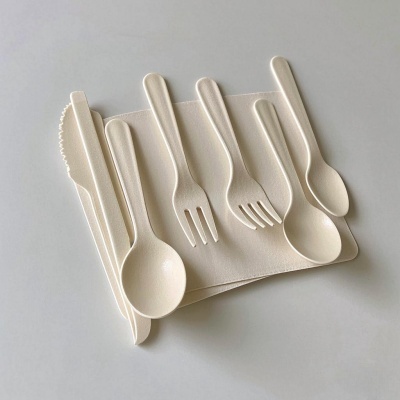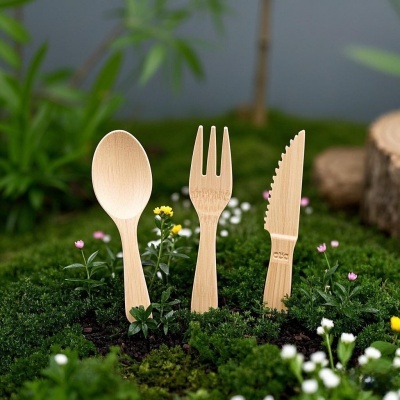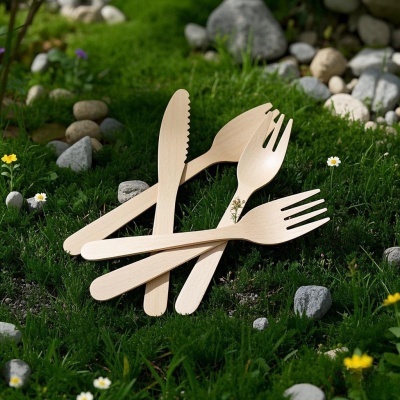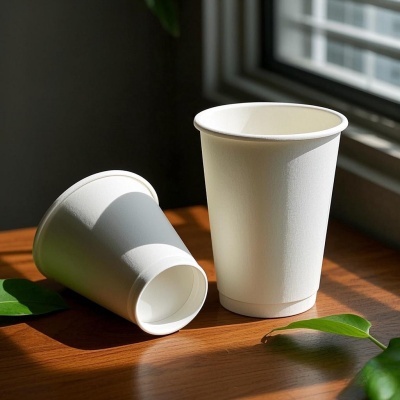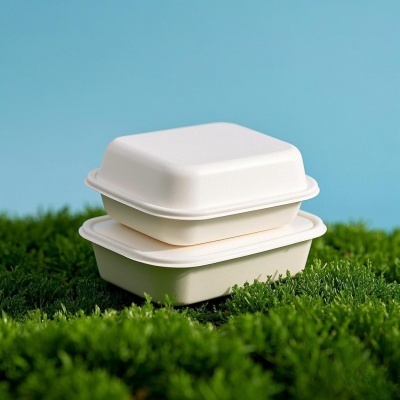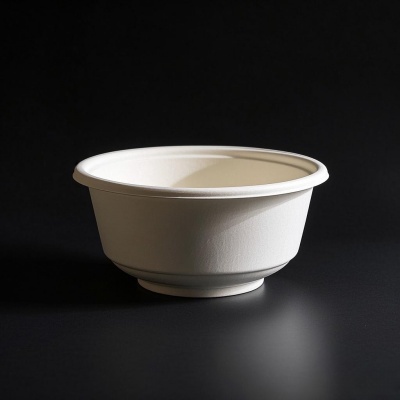Fast food has become a staple of modern life. It is convenient, affordable, and delicious. Whether it’s a quick bite on the go or a weekend treat, more and more consumers are opting for fast food takeaways. However, with the increasing demand for convenience comes a pressing need for sustainability.
Traditional takeaway utensils—often made of plastic–have a significant environmental footprint, contributing to the global plastic waste crisis. As customers become more environmentally conscious, fast food business are under pressure to shift towards eco-friendly alternatives.
In this guide, we’ll walk you through the benefits of switching to sustainable utensils, explore the environmental impact of disposable cutlery, and help you make informed decisions about sourcing, cost and customization.
Why Fast Food Business Should Switch to Eco-friendly Utensils?
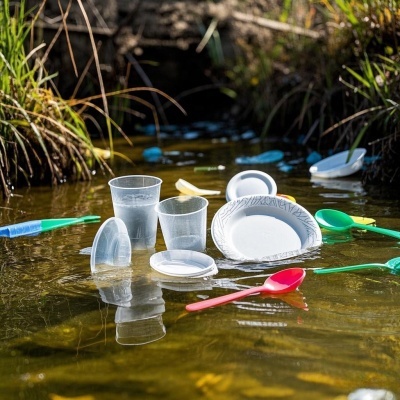
Sustainability is no longer just a trend—It’s a responsibility that business must take seriously. Consumers are actively seeking business that align with their values, and offering eco-friendly takeaway utensils is one of the most effective ways to attract environmentally–conscious customer. Moreover, governments around the world are introducing regulations to reduce plastic waste, with many regions imposing bans or restrictions on single–use plastic cutlery. By making the switch to biodegradable utensils, businesses can stay ahead of these changes while helping to foster a more sustainable future.
The Environmental Impact of Disposable Utensils
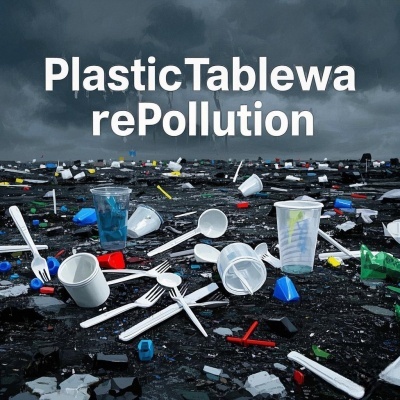
Plastic Waste Issues
Plastic is a major environmental concern due to its non-biodegradable nature. Millions of tons of plastic utensils end up in landfills and oceans every year, where they can take hundreds of years to decompose. This contributes to pollution, harms wildlife, and exacerbates climate change. By continuing to use plastic utensil.By continuing to use plastic utensil, fast food businesses are not only contributing to the waste crisis but also alienating eco-conscious customers.
The need for Biodergradable Alternatives
Switching to biodergradable utensils made of materials like sugarcane bagasse, bamboo and wood is crucial to reduce environmental impact. These materials are sustainable, decompose quickly and don’t leave harmful residues in the environment. By making the change, businesses can help close the loop on waste, offering customers a responsible dining experience while also benefiting the plantet.
Different Types Of Utensils & The Best Uses
There’s no one-size-fits-all when it comes to eco-friendly utensils. Different types of utensils are better suited for various fast food offerings, and understanding the best uses for each can help you make the right choices.
Material: Made from the fibrous byproduct of sugarcane after the juice has been extracted
Best Uses: Ideal for hot and cold foods, such as burgers, sandwiches, salads and wraps. Since bagasse is sturdy and heat–resistant, it works well for fast food that’s microwaveable or needs to hold up to liquids like soups or sauces.
Benefits: Food–safe, durable, microwaveable, compostable, and biodegradable. It’s an excellent choice for a wide range of fast food items.
Material: Bamboo is a fast-growing, renewable resource, making it a sustainable option for utensils.
Best Uses: Great for foods that require a bit more precision, such as sushi, salads, or rice-based dishes. Bamboo’s strength makes it perfect for heavier foods like grilled meats or rice bowls.
Benefits: Lightweight, compostable, and elegant. Bamboo utensils also have a unique aesthetic and feel, which can enhance the dining experience.
Material: often made for birch wood
Best uses: Best for food like sandwiches, finger foods, or pizza slices. Wooden utensils are perfect for quick, light meals that don’t require heavy-duty support.
Benefits: Completely biodegradable, sturdy and has a natural, rustic appearance.
4. Cornstarch Cutlery
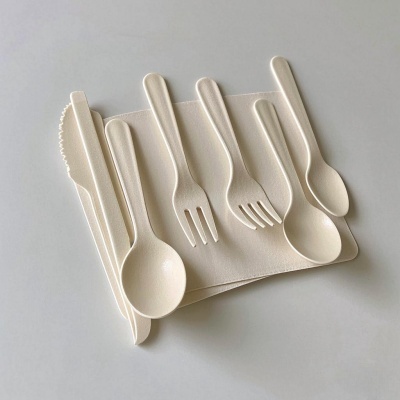
Material: Made from cornstarch polymers, which are processed into biodegradable plastics.
Best Uses: Ideal for light meals or cold foods, such as salads, desserts, or fruit bowls. Cornstarch utensils can also be used for takeaway containers to complement the eco-friendly packaging.
Benefits: Fully compostable, strong, and can mimic the feel of plastic while still being sustainable.
5. Biodegradable Chopsticks
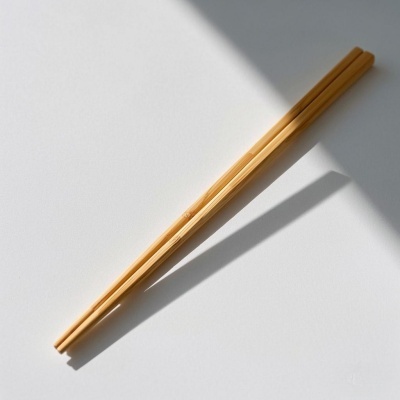
Material: Typically made of bamboo or wood
Best Uses: Perfect for Asian cuisine such as sushi, noodles , rice dishes, or dim sum. Chopsticks are especially useful for takeaway restaurants serving dishes like stir-fry, ramen, or sushi rolls.
Benefits: Lightweight, compostable, and durable. Bamboo chopsticks are sturdy and naturally resistant to breakage, making them suitable for a variety of food textures.
6.Bagasse Cups
Material: Made from sugarcane pulp (bagasse), which is a fibrous byproduct left after extracting sugar from the cane.
Best Uses: Perfect for serving beverages like coffee, tea, smoothies, or even soups. Bagasse cups are great for fast food takeaways offering hot or cold drinks, especially in combination with biodegradable lids.
Benefits: Leak-proof, compostable, and sturdy. Bagasse cups are heat-resistant and do not leak or get soggy, making them ideal for both hot and cold beverages. They are also a good alternatives to plastic cups and are food-contact safe.
7. Bagasse Clamshell Container
Material: Made from sugarcane bagasse, these containers are molded into a calmshell shape, which makes them ideal for food takeaway packaging.
Best Uses: Perfect for burgers, sandwiches, fried foods and salads. Bagasse clamshells are ideal for takeaway orders that need a secure, leak-proof container, as they are sturdy and provide good insulation for hot food.
Benefits: 100% biodegradable , leakproof, microwave-safe, and compostable. Bagasse clamshells offer a secure, convenient way to package fast food, reducing waste without compromising on strength or durability.
Material: made from sugarcane pulp (bagasse), which provides a durable and biodegradable option for bowl-shaped containers.
Best Uses: Suitable for serving soups, salads, rice bowls, pasta, or takeout snacks. These bowls work well for both hot and cold foods and are commonly used in food joints serving soups, noodles bowls or salads.
Benefits: Biodegradable , microwaveable, and leak-resistant. Sugarcane bowls are sturdy enough to hold heavier foods like pasta or fried dishes, and they won’t become soggy, making them a reliable choice for food-to-go.
How to Source High-Quality Eco-Friendly Utensils for Your Business?
When sourcing eco-friendly utensils for your fast food business, it’s essential to find reliable suppliers who offer both quality and sustainability. Here’s what to look for to ensure you’re making the right choice:
Certifications and standards: Look for products with certifications that prove they meet environmental and safety standards.
Sustainable Materials: Choose supplier that use renewable, sustainable materials like bamboo, sugarcane bagasse, or wood. These materials are not only better for the planet but are also typically biodegradable, ensuring that your utensils leave behind a minimal environmental footprint.
Transparency and Ethical Sourcing: Work with manufacturers who are transparent about their sourcing practices and manufacturing processes. Ideally, they should use responsibly sourced materials and adhere to ethical production standards.
Coustomization Options: Many eco-friendly manufacturers like Hengyu offer the option to customize utensils with your business logo or branding. This adds a professional touch and helps strengthen our brand identity, even on takeaway orders. It also makes your business stand out as one that cares about both quality and sustainability.
Reliability and Consistency: Ensure that your manufacturer can meet your order quantities consistently. Look for reviews or ask for references to gauge the manufacturer’s reliability in delivering on time and providing high-quality products consistently.
Be carefully selecting your manufacturer, you can confidently offer high-quality, eco-friendly utensils that align with your sustainability goals and enhance your customer experience.
Cost Vs Value: Making the Right Investment
While eco-friendly utensils may have a higher upfront cost than plastic alternatives, the value they bring to your business far outweighs the expense. Not only will you be helping reduce environmental harm, but you’ll also be investing in a brand image that resonates with customers. Over time, consumers’ preference for businesses that are socially responsible can lead to increased loyalty and sales, making the investment in eco-friendly utensils worthwhile. Additionally, as more business make the switch, the cost of biodegradable utensils is expected to continue decreasing.
Conclusion
Selecting the right utensils for your fast food takeaway business is more than just choosing the most convenient option. By considering factors such as material, functionality, durability, and environmental impact, you can provide a better customer experience while enhancing your brand’s sustainability efforts.
Eco-friendly, durable and customizable utensils can improve the overall dining experience for your customers and help you stay ahead in a competitive industry. Whether you choose wood, sugarcane bagasse, bamboo or other compostable options, the right utensils will not only complement your food but will also reflect your commitment to quality, sustainability and customer satisfaction.
Post time: Apr-01-2025
